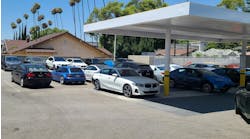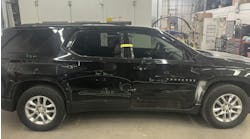How Outside Sales Can Drive Growth for Your Collision Shop
Most collision repair shops rely on a steady flow of insurance work and walk-in customers to keep their bays full. But what if you could take control of your shop’s growth instead of waiting for the next job to come through the door? That’s where a consistent focus on outside sales comes in!
Implementing a solid outside sales program can unlock new revenue streams, build long-term relationships, and create a steady pipeline of work, giving your shop the competitive edge it needs. Whether it’s networking with local businesses, insurance agents, or fleet accounts, an outside sales strategy can significantly impact your bottom line.
DRIVE coach Nancy Ellis provided expert advice on where to find new sales opportunities, who should be doing the selling, and how you can make it work for your business.
Where to Focus Your Outside Sales Program
Most shops focus their marketing efforts on individual customers, the everyday people who get into an accident and need repairs. While that’s important, you’re leaving money on the table if you aren’t also targeting other sources of business. Ellis emphasizes, “A collision shop has several different customer “bases,” each with their own methodology of attraction. If only one base is being worked, there are business opportunities going to waste.”
Before hitting the pavement, take the time to research local businesses that could be valuable prospects for your collision shop. Identify companies with service gaps that your business can fill as well as other potential referral partners in your area.
Think about the companies in your area that have fleets, such as plumbing and HVAC companies, delivery services, rental car agencies, taxi and rideshare services, even police departments. Their vehicles get into accidents just like personal cars do, and when that happens, they need a reliable shop to get them back on the road fast.
Now, consider insurance agents and adjusters. They frequently recommend shops to their clients. If your shop has a strong relationship with local agents, they’re more likely to send business your way.
There are also major opportunities to build partnerships with non-competing repair shops or dealerships that do not offer bodywork in their service centers. A general repair shop that doesn’t offer collision services could refer their customers to you when they need bodywork, and vice versa. The goal of an outside sales program is simple: build relationships that bring in steady, high-value work!
Who Should Handle Outside Sales?
Not everyone is cut out for sales. The person responsible for outside sales, whether it’s you, a team member or a dedicated hire, needs to be outgoing, persistent and above all else, results-driven! Closing a deal after just one call or one visit is every salesperson’s fantasy, but the reality is that it just doesn’t often happen that way in the real world. An outside salesperson must be prepared to persist until they’ve achieved the goal.
Here’s what else to look for in an outside salesperson and how to begin training them:
- Great Personality – They need to be confident and approachable to build trust with insurance agents, fleet managers and other business decision makers.
- Excellent Communicator – They should be able to listen, ask the right questions and explain why your shop is the best choice.
- Motivated by Success – Salespeople who are truly driven by the satisfaction of closing a deal tend to perform better!
- Persistent, But Not Pushy – Building relationships takes finesse and time, and a good salesperson won’t give up after one meeting.
In addition to these traits, Ellis also says it’s important for a good outside sales rep to be organized, quick-thinking and flexible. “They need to be able to face and handle a wide variety of customers and situations and effectively deal with difficult situations if need be.”
Training an outside salesperson to close the deal starts with providing a solid understanding of your shop’s key value propositions, whether they may be faster turnaround times, seamless insurance handling, specializations, etc. Role-playing exercises will help them fine tune their skills in active listening, handling common objections and proven sales techniques like the assumptive close. Teach them to leverage your business’s strong reputation by providing social proof to prospective partners in the form of testimonials.
If hiring a full-time salesperson isn’t in the budget yet, consider assigning this role to someone who’s already on your team who can dedicate time to networking and building partnerships. Incentivize this additional responsibility with a competitive bonus structure.
How to Build Relationships That Bring in Business
Now that you know who should be handling outside sales, let’s talk about how to make it work.
The most effective way to secure long-term business is by routinely engaging with potential partners. A one-time visit won’t cut it. Your outside salesperson needs to stay in front of decision-makers until the relationship is locked in.
Regardless of which type of business your outside salesperson is engaged with, they should know a basic formula for consultative selling that involves asking these questions:
- Who do you use for your collision repairs?
- What do you like about them?
- What would you change about them?
The answers to these questions help you identify their needs and how you can provide a solution. In other words, they tell you how you can successfully sell to the prospect!
Here’s a simple blueprint:
Get in Front of Fleet Managers and Business Owners
- Identify local businesses with vehicle fleets.
- Call or stop by in person to introduce your shop.
- Ask about their current process for collision repairs and what challenges they face.
- Offer a better solution! This is the basis of consultative selling.
Build Relationships with Insurance Agents and Adjusters
- Visit local insurance agencies and introduce yourself.
- Explain how your shop makes their job easier (faster estimates, seamless communication, quality work).
- Stay in touch—drop off coffee, send thank-you notes, and check in regularly.
Partner with Non-Competing Repair Shops and Dealerships
- Connect with local general repair shops or dealerships that don’t offer bodywork.
- Offer a referral program in which they get a small incentive for sending business your way.
- Refer mechanical work to them in return; it’s a win-win.
Pro Tip: When you meet with prospects, always come prepared with basic materials — business cards, brochures or a simple one-sheet outlining who you are, what services you offer and how they can reach you. A professional, well-prepared first impression sets the stage for a productive business relationship.
Tracking Success: How to Measure Your Outside Sales Program
Like any investment in your business, you need to track results to see what’s working. Here are the key performance indicators (KPIs) Nancy says you should monitor:
- Number of Accounts Secured – How many new businesses, insurance agents or referral partners have you signed?
- Gross Sales from Outside Sales – What percentage of your revenue comes from the relationships your outside sales team has built?
- Number of Vehicles Serviced from Outside Sales Accounts – Are these partnerships bringing in consistent work?
- Salesperson Activity – Track the number of visits, calls, and follow-ups your salesperson completes. If they aren’t making enough contacts, they won’t see results.
As the owner, it’s your responsibility to set high expectations for the sales team and hold them accountable for results (even if YOU are doing the sales). Without accountability, even the best sales strategies will fall flat.
Common Pitfalls and How to Avoid Them
Ellis shared that many shops fail to see results from outside sales because they simply don’t make it a consistent priority! Here are some common mistakes and how to avoid them:
- Inconsistent Effort – You can’t expect results if you’re only reaching out to new accounts when business is slow. Make outside sales a daily or weekly routine.
- Focusing Only on Price – If the only selling point your salesperson uses is “we’ll beat their price,” you’ll lose in the long run. Instead, focus on the value your shop brings.
- Not Tracking Performance – If you don’t measure results, you won’t know what’s working. Track KPIs and adjust your strategy as needed.
- Hiring the Wrong Person – A good outside salesperson needs to be motivated, persistent and relationship-driven. If they aren’t comfortable talking to new people and selling your shop, they won’t get results. Even more importantly, it MUST be understood that this person is the face of your business. If they are not representing your business correctly, they may do more harm than good!
Is Outside Sales Right for Your Shop?
Absolutely! An outside sales program doesn’t just bring in more work; it brings in the right kind of work. Instead of relying on random customers finding you, you’re securing steady, high-value accounts that keep your bays full year-round. If you’re serious about growth, it’s time to stop waiting for business to come to you and start going after it.
Ready to take action? Start by identifying potential fleet accounts, insurance agents and referral partners in your area. Hire or assign someone to handle outreach, track their efforts and watch as your collision shop grows. Stay persistent! The more effort you put into outside sales, the more opportunities you’ll create. By making it a priority, you’ll not only increase revenue but also establish your shop as the go-to choice for high-quality collision repairs in your community.




